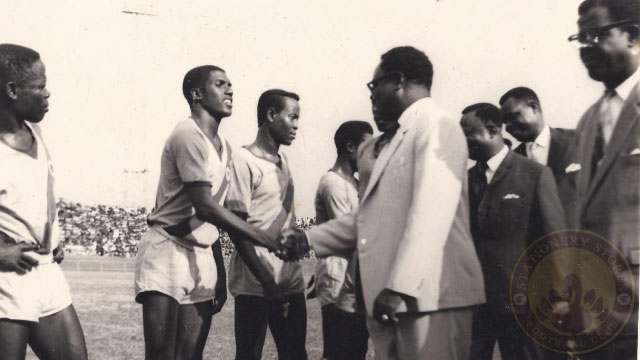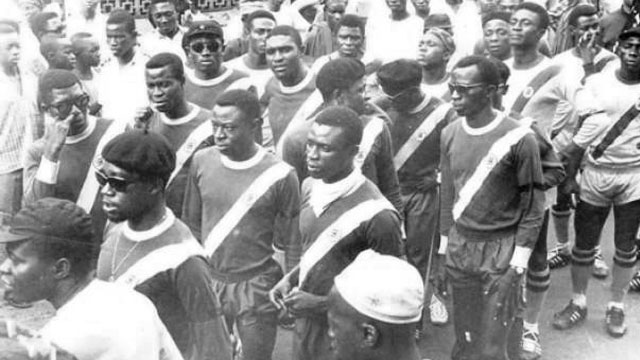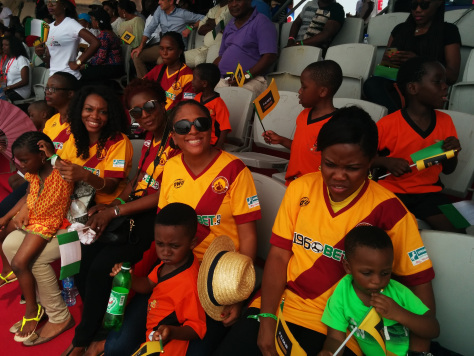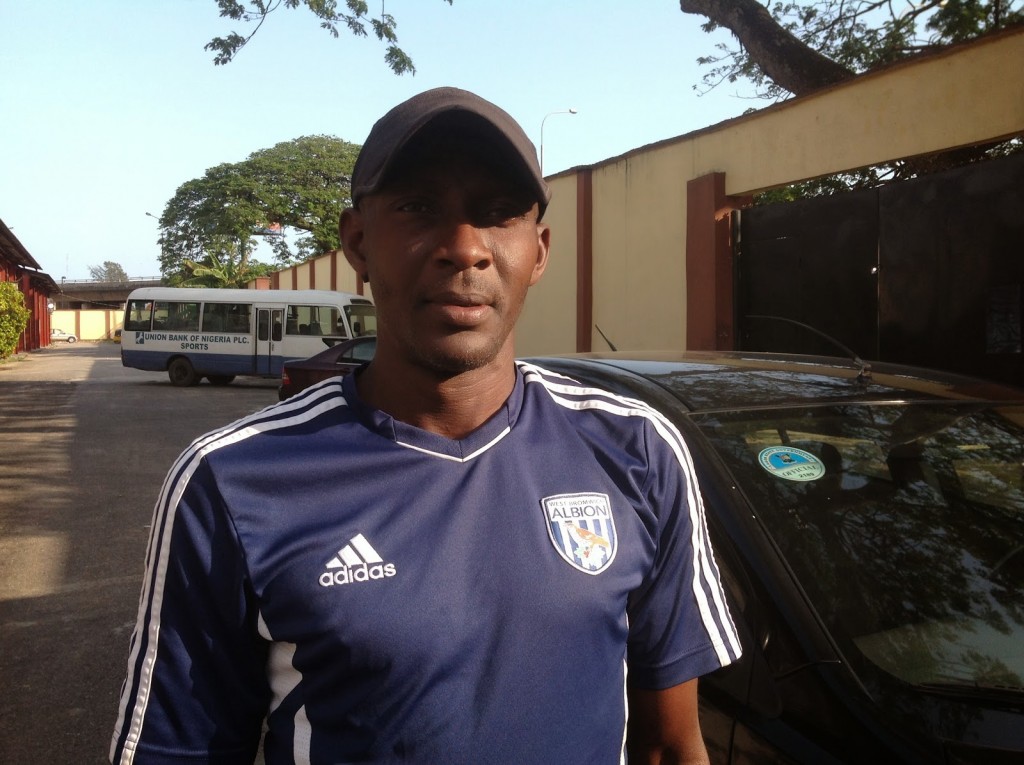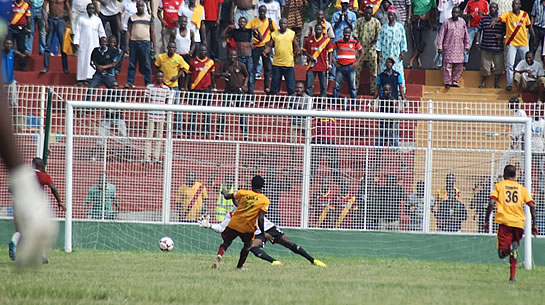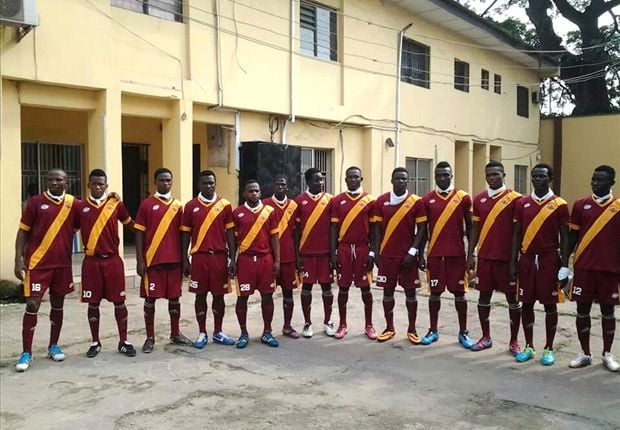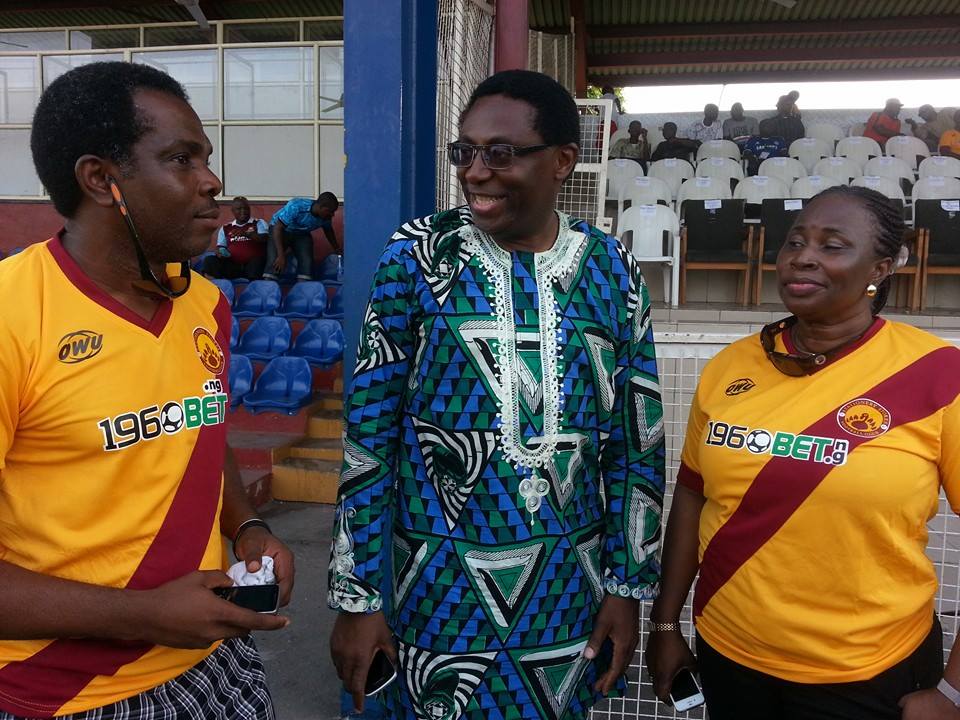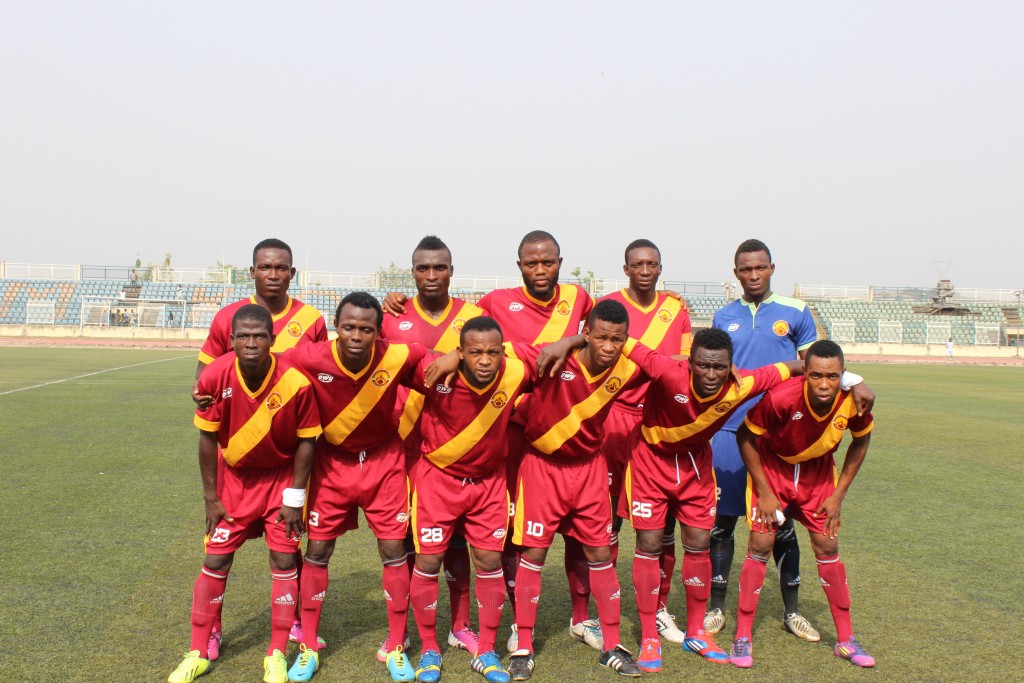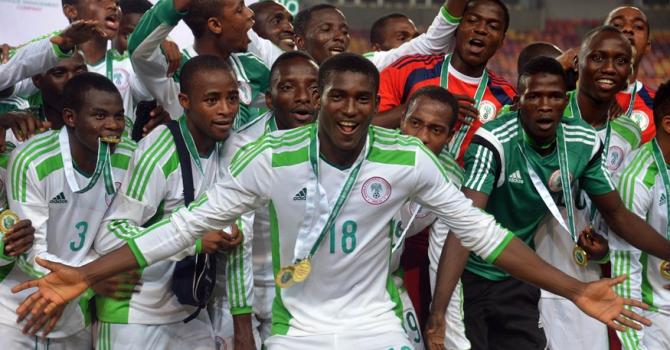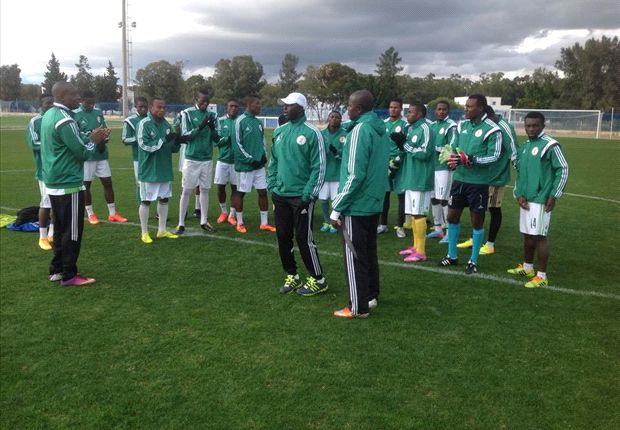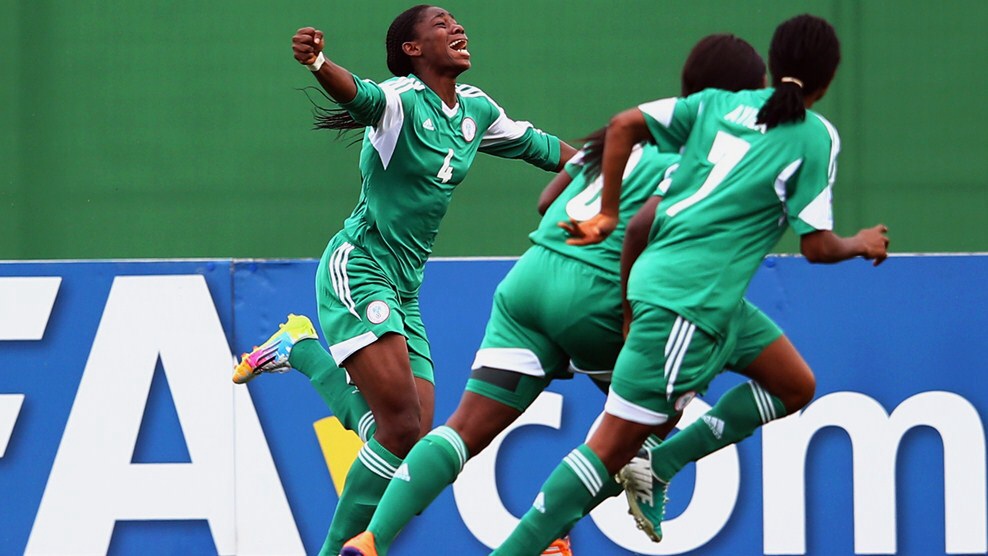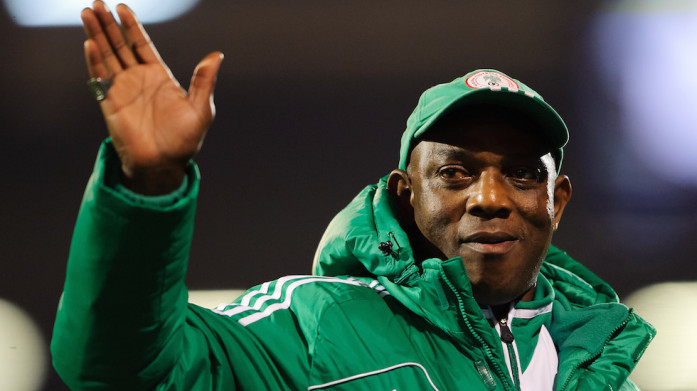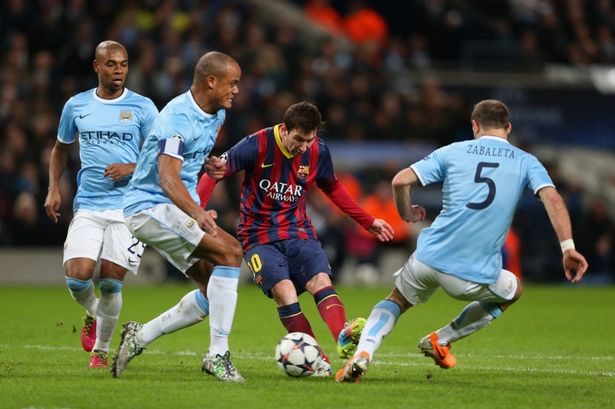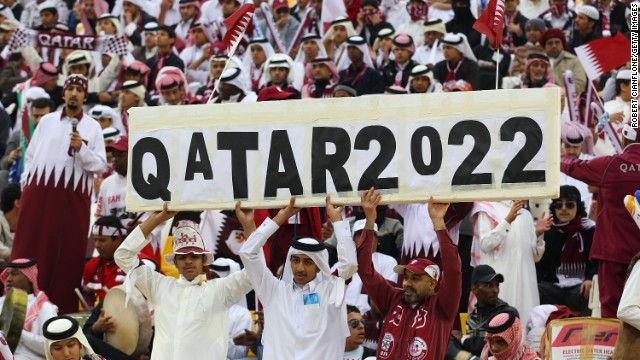Israel Adebajo founded Stationery Stores on February 15, 1959 and that’s precisely 56 years and 7 days ago.
At the moment, Lagos’ darling team is walking with crutches after many years crawling under the weight of crisis.
Stores couldn’t survive the drop after prosecuting the Nigeria National League (NNL) with a bulk of the players they inherited from Union Bank Football Club who gave Adebajo Babes their slot in the NNL.
The team will now feature in the amateur division next season.
Advertisement
Stores were last seen at the 2014 COPA Lagos Beach Soccer tournament and their numerous fans will be hoping it won’t be for the last time.
There’s no denying the fact that the demise of Stores robbed the league of some element of excitement no matter how bizarre it was.
We look at six stories, the super stories – or you could call it the sorry stories – of Super Stationery Stores of Lagos.
Advertisement
UNPARALLELED SUPPORT
Call them fans or fanatics, Stores had them in droves!
The darling team of Lagos ranked among the best supported side in Nigeria during their prime. Unlike most other clubs where their fans are usually only heard on match days, Stores supporters are an integral part of the team.
Advertisement
Many have even gone from been called supporters to financiers.
In 1985, when the club had problems settling the transfer fees of their new signings, a fan came to their rescue.
In the early 90s, Sola Idowu – Mr Anonymous – was the brain, well money, behind the success of the team which saw them win the FA Cup in 1990 and the league in 1992.
He spent huge sum of money on Stores that not only took the team to the very top of Nigeria football, but brought joy to the faces of their fans and fanatics!
Advertisement
The love for the team started when Stores won the Challenge Cup in 1967. Before then, Lagos fans were tired of seeing clubs from outside the state coming to pick the Challenge Cup from under their noses at the Mecca of Nigerian football – the King George V Stadium.
They yearned for a real indigenous club because then most of the teams based in Lagos were owned by the various federal establishments.
Advertisement
Israel Adebajo, the founder of the Nigeria Office of Stationery Stores (NOSS) came to their “rescue”. After injecting the team with players from other teams, Stores won the coveted cup in 1967 and repeated the feat in 1968.
An unparalleled love began and continued even after the death of Adebajo in July 1969.
Advertisement
And a former player, indeed one of the best players the club ever had, Haruna Ilerika spoke on the unflinching support from the fans.
“The support which was built over time, was as a result of the fluency the club introduced to football in Nigeria in the 60s,” he told Sportsweek in 1986.
Advertisement
“Stores came as a redeemer to Lagos fans and for that they will be loyal to the club.”
Up Super!
BRIBERY SCANDAL
“Anybody with a free mind will believe that something has happened because of the way Stores defenders played that day,” Stores patron, Femi Aluko, said.
In July 6, 1985, Stores lost 4-0 to Abiola Babes at the Asero Stadium and the club management smelt a rat! The players were accused of match sell-out and a probe panel was promptly set up.
The bribery scandal exposed the lack of confidence the club officials had for the players. Granted, it was quite scandalous to lose 4-0 to your rival but the players felt the management should have looked at other factors that led to the defeat instead of accusing them of collecting bribe.
The Oluwo-panel still sat and later affirmed that indeed money had exchanged hands. The outcome saw the exit of several players including star man Audu Ibrahim.
Ilerika also spoke on one of the darkest episodes in the club’s history.
“Stationery Stores had learnt a lot from the bribery scandal and concrete efforts are being made to plug the loopholes that may let in such problems in future,” he said.
“One of such is the reduction in the number of foreigners the team would be employing their services.”
Audu Ibrahim was a foreigner.
Five years later, Stores lost 2-1 at Onikan Stadium to Iwuanyanwu Nationale which gave the league title to the Owerri-based team.
Like in 1985 it smelt of money exchanging hands and Aluko’s quote above could also depict the situation. Thompson Oliha and Ben Ogbuisi’s goals called Stores defenders to question.
Like in 1985, officials and the supporters almost engaged in a free-for-all fight.
But unlike 1985, there was no probe panel but tongues never stopped wagging.
FROM CHAMPS TO CHUMPS
When Stores won the national Division One league in 1992, it was a 15-year wait for the ultimate trophy in club football in Nigeria. The 1977 triumph was more dramatic and worth recalling.
Stores and Rangers were tied on points, goals aggregate, goals for and goals against. And there can only be one winner!
“In the boardroom of the National Sports Commission”, Segun Odegbami wrote in his book Nigerian Football 1960-1990 “a coin was tossed to decide which side would represent the country (in the 1978 Africa Club Championship). Stationery Stores of Lagos proved the luckier team”.
In 1992, the Flaming Flamingoes won the title on the pitch playing arguably the best football in the league which saw them pip Shooting Stars and Udoji United to the diadem.
But it was a tumultuous season for the champions in 1993.
A season-long crisis doused the fire in Flaming which saw them lose their league title, crash out of the FA Cup after the first round, then lose to Zamalek in the semi-final of the Africa Champions Cup.
“The management crisis really finished us,” Julius Akpele, the club’s left-back, said.
“It got to a stage when sign-on fees were refused the players. Salaries were also not paid and players had to survive on charity. It was that bad.”
Stores paid the ultimate price when they failed to honour two league games and fell afoul of NFA directive which said that if a team misses two matches without sufficient reasons for doing so, then the team will be relegated.
The team had sufficient reasons but it was a conflicting one – from the two camps that fought for the control of Stores.
NOSS, the owners of the club, wrote to tell the NFA why the team did not honour the games but the other camp through the backing of the players wrote another letter.
Stores were kicked out of the first division to the second.
Twenty-two years after, they are yet to return to the elite league.
Poor Super!
STORES WRITERS ASSOCIATION OF NIGERIA
No, that’s not the meaning of the acronym SWAN.
But remove the “Sports” and replace it with “Stores” and you will have an association of sports writers who publicly backed Stores during their title winning season of 1992.
Their agenda was to ensure the best for Stores and they were not pretentious about it. They even wore “uniforms” to league venues.
“I saw two groups of people in uniform and I presumed Stores had dressed two full teams for the match,” Shaibu Amodu, El-Kanemi coach told Complete Football.
“It was later I realised that one group consisted of players and the other of journalists.”
Their open involvement with a team raised ethical issues. Questions like “what level of partisanship is acceptable in professional sports reporting” and “what does partisanship do to the credibility of a sports writer?” arose.
“It is true that nearly all sports writers are partisan in one way or the other,” president of SWAN, Fan Ndubuoke, said.
“This is understandable because despite their calling, they are human and they are bound to have soft spots for particular clubs or teams. But when they allow their personal sentiments to becloud their sense of judgment, it is a most unfortunate development.
“The trouble with journalists deeply involved with particular clubs is that they don’t realise the ethical implications of their actions.”
On his part, Sam John, the group sports editor of the Daily Times, condemned the act outright.
“The act is totally unprofessional,” he said.
“A sports journalist is regarded by the public as a fair commentator and he must be seen as such. Once he allows himself to be bought over by a club, then he has lost his credibility and the moral right to do his job. It is quite legitimate for a sports writer to like a club for whatever reason. But it is completely unacceptable for him to fly the kite of that club in public like the Stores journalists have done this season.”
But Segun Adenuga, a seasoned journalist and one of the brains behind “SWAN”, saw no conflict of interest in the discharge of the duties of their members and explained why the association was formed.
“The motive behind the establishment of the Sports writers group is to win public goodwill for Stationery Stores,” he said.
“For too long, Stores has been labelled as a club for thugs. Even our supporters do not foment trouble; people blame them for any stadium disorderliness, forgetting that not every spectator at the stadium is a Stores supporter.
“We traced this development to the bad publicity the club gets from sportswriters majority of whom had also formed the opinion that Stores is a troublesome club. We therefore decided to bring the sports writers closer to us so that they could know exactly what goes on inside the Super Stores set-up.”
He waved aside the criticism of other journalist in SWAN levelled against those in “SWAN”.
“Indeed, I have heard all the criticisms passed on these journalists by some of their colleagues. But I know that most of them are hypocrites. All of them have skeletons in their cupboards,” he said.
“Take the SWAN president, Mr Fan Ndubuoke, for instance. He saw nothing wrong in taking up appointment with the former board of the NFA even though he was writing for Sportslink. Of course, he became a mouth piece of the NFA. But now that he is no longer there, he feels free to talk about ethics and all that. It is not surprising.
“Some of our critics talk about neutrality in sports journalism. My question to them is why do they support the national teams? Why don’t they adopt the attitude of let-the-better-team-win if they are that professional and neutral?
“I know they will likely talk about the factor of ‘nationalism’ and all that. Well, my response is that I also support Stores because of the factors of ‘club-ism’, ‘state-ism’, ‘area-ism’, ‘grassroots-ism’, or what have you. The truth really is that partisanship is part of professional sports writing.”
Up “SWAN”!
EMPTY BENCH
Can you imagine a team coming for a match with only the starting XI? Unimaginable! Implausible! Impossible! Improbable! You are not that former lawmaker so we guessed correctly that you will run out of less crincum-crancums -like words!
In a 2004 Division 1B match against Nitel United at Onikan Stadium on March 14, Stores set a record of having no player on the bench.
Their coach, Kabiru Adedokun was the cynosure as he sat on the bench with his assistants with no reserve players in case he needed one.
No prize for guessing the outcome of the match.
Stores lost at “home” 2-1 to their fellow Lagos-based team.
When cornered after the game, Adedokun said his team lost because he could only parade 11 players as the others failed to show up.
“We had the game under our control in the first half but fizzled out in the second half because we could not bring in any replacement for the tired ones,” he told Punch.
Up Super!
THE CURSE OF IGENIWARI GEORGE?
Without sounding superstitious, Super Stores seems to be under the curse of Igeniwari George.
Igeniwari George, the younger brother of Finidi George, died on September 9, 1995 from gunshot wound during a Challenge Cup match between his club Rangers and Stores at the Lekan Salami Stadium, in Ibadan.
Trouble began when Stores fans converged on the pitch and around the stadium protesting the referee’s 87th minute penalty which gave Rangers a 1-0 win. In the mayhem, shots were fired and George was hit by a stray bullet which pierced the Mercedes Benz bus that was conveying his team back to their hotel after securing the victory.
Efforts to save his life proved futile as the University College Hospital where he was initially taken to lacked adequate facilities like water and blood which could have ensured a successful operation.
By the time he was taken to Alafia hospital, he had lost a lot of blood and gave up the ghost at about 10pm muttering, according to Complete Football, “Finidi”, the name of his elder brother.
The Nigeria Football Association (NFA) set up a panel headed by Jonathan Ogunfere which later proposed a ten-year ban for Stationery Stores and their supporters.
It was reduced to three years and since then, the club has not returned to where they belong in Nigeria football.
But Stores will surely return to soccer fame and glory – someday.
And like a popular song you hear during matches involving the team: “Let us not, out of malice, spoil a good thing since we are all friends of Israel Adebajo.”
It was never rendered in English language but you can google-search the Yoruba translation. And while on it, you can do a reverse for Poku lo wo e.
Up Flaming!
Add a comment
